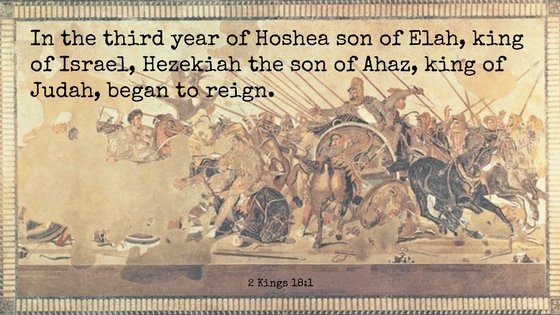
My choice for this week’s blog is to recount the story of a courageous man of the Bible and of his time, the King of Judah, Hezekiah ben Ahaz.
Hezekiah came to the throne of Judah in 715 B.C.E., a turbulent time when the Southern Kingdom was subservient to Assyria. To make matters worse, his father King Ahaz had taken gold from the temple and palaces to pay tribute to the Assyrians and had brought the worship of Cannanite gods to his nation.
Hezekiah trusted in the Lord, the God of Israel. There was no one like him in all the kings of Judah, either before him or after him. He held fast to the Lord and did not cease to follow Him; he kept the commands the Lord had given Moses; he was successful in whatever he undertook. (2 Kings 18:5-7). During this time, he began ridding the Temple of Cannanite gods which, politically, was no small feat. He improved fortifications and built a tunnel – some 1,750 feet long, cut through solid rock – to carry spring water to a pool inside Jerusalem’s walls so that the city could withstand a siege. (Note: this tunnel was considered an engineering marvel of its day and still exists.)
During the fourth year of Hezekiah’s reign, the Northern Kingdom was swallowed up by Assyria and “the King of Assyria deported Israel to Assyria and settled them in Halah […] in Gozan […] in towns of the Medes.” (2 Kings 18:11). They were lost to history.
Then in the seventeenth year of Hezekiah’s reign a new king of Assyria, Sennacherib, attacked all of the fortified cities of Judah including Jerusalem. Hezekiah, in a very human move, pays a tribute of 300 talents of silver and 30 talents of gold in hopes of placating Assyria, but it doesn’t work. Instead the Assyrian juggernaut is reinforced around Jerusalem to 185,000 soldiers and awaits Hezekiah’s surrender. All the kings and principalities except Judah have been defeated and destroyed by the ruthless Assyrians, and Hezekiah and Judah are left facing terrible odds.
The chief officer of the Assyrian army showed up and in a loud voice in the language of Judah (Hebrew) shouted to those on the city walls: “Do not let Hezekiah deceive you, for he will not be able to deliver you out of my hand” (2 Kings 18:26-29). The chief officer cajoled the people to make a separate peace with him and be conveyed to a land of plenty where they would live and not die. But they (Judah) remained silent as Hezekiah ordered.
After receiving the Assyrian message, Hezekiah tore his clothes and put on sackcloth and retired to the Temple to pray. Isaiah assured Hezekiah that God had heard his prayers and that the Assyrians “shall not come into this city or shoot an arrow there, or come before it with a shield or cast up a siege mound against it. (2 Kings 19:14-34).
“And that night the angel of the Lord went out and struck down 185,000 in the camp of the Assyrians. And when people arose early in the morning, behold, these were all dead bodies. Then Sennacherib king of Assyria departed and went home and lived at Nineveh.” 2 Kings 19:35-26
King Sennacherib was to receive a deadly comeuppance: “while he was worshipping […] his god Nisroch, his sons […] cut him down with the sword and they escaped to the land of Ararat.” (2 Kings 19:37) This had the effect of bringing internal chaos to Assyria thereby cancelling out its threat.
Hezekiah fell ill after the Assyrian departure and was told by Isaiah that he would die. Hezekiah prayed to be spared: “How I have walked before thee in truthfulness and with a whole heart, and have done what is good in thy sight.” (Isaiah 38) Speaking through Isaiah, God grants the faithful Hezekiah 15 more years of life and promises to defend Jerusalem against the Assyrians. Showing a sign of favor, the Lord causes the setting sun’s shadow to retreat up the steps on which it had fallen. The Kingdom of Judah remained intact under the reign of Hezekiah.
About our guest blogger: Ken Handley is happily retired and spends his time volunteering in hands-on capacities with a number of associations. He loves archeology and the Florida Gators, and he’s currently a member of Servants’ vestry. He’s thankful to the Lord for his many blessings.
